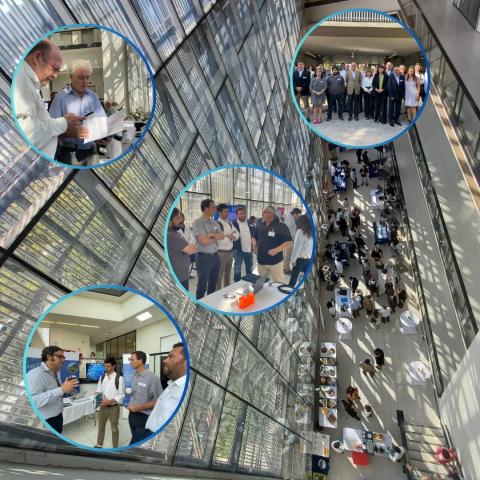
In an unprecedented milestone for agricultural innovation in Chile, the Center for Nanoscience and Nanotechnology, CEDENNA, successfully carried out its first "Nanotechnology Fair for the Agricultural Sector", bringing together prominent government, business and agricultural leaders in Chile. . This pioneering event offered a unique platform for the discovery and discussion of cutting-edge nanotechnological solutions, marking a before and after in the way the sector faces environmental and sustainability challenges. With a clear vision towards the future, the center is positioned at the forefront of applied science, promoting not only technological advancement but also the sustainable and resilient development of agriculture in Chile.
Sensors capable of revealing the presence of pesticides and fungicides in record time; devices for the detection of pathogens in food; nanoparticles made from native and Antarctic plants to make fertilizers and pesticides; intelligent packaging created with nanoparticles to preserve food, safeguarding its quality and organoleptic conditions, and generation of biogas with nanoparticles, were some of the examples of nanotechnology for agriculture that the attendees, leaders of agricultural companies, observed directly in the Center's facilities.
The Rector of Usach, Dr. Rodrigo Vidal, participated in the opening ceremony, among other authorities; the president of the National Agricultural Society and former minister of the sector, Antonio Walker; the executive director of the CEDENNA Foundation and 2019 National Prize for Exact Sciences, Dr. Dora Altbir and the executive director of the Foundation for Agrarian Innovation, Francine Brossard.
Chile eco-food power
On the occasion, the executive director of the CEDENNA Foundation and National Prize for Exact Sciences, Dr. Dora Altbir, highlighted “the necessary synergy that must be strengthened between scientific research and the business sector, because centers like ours have the experience and developments concrete measures with which it can contribute to a more sustainable, productive Chile capable of facing the challenges of the future by providing cutting-edge science,"
The President of the SNA stressed that it is the purpose of the private institution “to transition from being an agri-food power to being an ECO food power. And nanotechnology is fundamental within this modernization process.”
“We have seen an enormous list of areas in which it can impact food quality and safety, genetic improvement, early detection of diseases, care of soil and water, all these elements are a complement to this important change in the Chilean agriculture,” he emphasized, highlighting the importance of this “great joint challenge.”
"In a few years the world is going to demand 50% more food and we are going to have to produce it with fewer farmers, with less soil, with less water, in a context of climate change and therefore we have to do it with great care." more technology to achieve the superior yields necessary to meet the demand of a growing population,” he concluded.
The Executive Director of the Foundation for Agrarian Innovation (FIA) agreed that each of the projects presented by CEDENNA “is essential to support farmers to have early warnings that allow them to face the current climatic circumstances with safety for human health. and environmental and with the necessary regulation for that”
“From now on, I leave the doors open to CEDENNA to advance together in this purpose,” he stated.
Attendees toured the exhibition, were able to talk directly with the researchers, request specific details about the use of different technologies and even schedule future meetings.
“We believe that this is a unique opportunity to highlight how NC and NT made in Chile can revolutionize national agriculture and offer technological solutions of excellence. It can change the way we grow food and solve urgent agricultural problems and this fair shows us that our country has knowledge and capacity in this matter,” said the rector of Usach, Rodrigo Vidal, highlighting that contributing to sustainability is an university commitment.
- Log in to post comments







